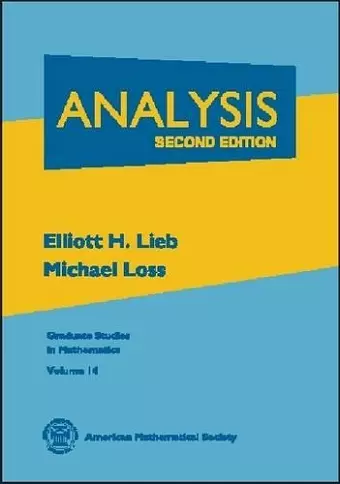Analysis
Elliott H Lieb author Michael Loss author
Format:Hardback
Publisher:American Mathematical Society
Published:30th Mar '01
Currently unavailable, our supplier has not provided us a restock date

Significantly revised and expanded, this new Second Edition provides readers at all levels - from beginning students to practicing analysts - with the basic concepts and standard tools necessary to solve problems of analysis, and how to apply these concepts to research in a variety of areas. Authors Elliott Lieb and Michael Loss take you quickly from basic topics to methods that work successfully in mathematics and its applications. While omitting many usual typical textbook topics, ""Analysis"" includes all necessary definitions, proofs, explanations, examples, and exercises to bring the reader to an advanced level of understanding with a minimum of fuss, and, at the same time, doing so in a rigorous and pedagogical way. Many topics that are useful and important, but usually left to advanced monographs, are presented in ""Analysis"", and these give the beginner a sense that the subject is alive and growing.This new Second Edition incorporates numerous changes since the publication of the original 1997 edition and includes: a new chapter on eigenvalues that covers the min-max principle, semi-classical approximation, coherent states, Lieb-Thirring inequalities, and more; extensive additions to chapters covering Sobolev Inequalities, including the Nash and Log Sobolev inequalities; new material on Measure and Integration; many new exercises; and, much more. ..The Second Edition continues its no-nonsense approach to the topic that has made it one of the best selling books on the subject. It is an authoritative, straight-forward volume that readers - from the graduate student, to the professional mathematician, to the physicist or engineer using analytical methods - will find useful both as a reference and as a guide to real problem solving.About the authors: Elliott Lieb is Professor of Mathematics and Physics at Princeton University and is a member of the US, Austrian, and Danish Academies of Science. He is also the recipient of several prizes including the 1988 AMS/SIAM Birkhoff Prize. Michael Loss is Professor of Mathematics at the Georgia Institute of Technology.
This is an excellent textbook on analysis and it has several unique features: Proofs of heat kernel estimates, the Nash inequality and the logarithmic Sobolev inequality are topics that are seldom treated on the level of a textbook. Best constants in several inequalities, such as Young's inequality and the logarithmic Sobolev inequality, are also included. A thorough treatment of rearrangement inequalities and competing symmetries appears in book form for the first time. There is an extensive treatment of potential theory and its applications to quantum mechanics, which, again, is unique at this level. Uniform convexity of Lp space is treated very carefully. The presentation of this important subject is highly unusual for a textbook. All the proofs provide deep insights into the theorems. This book sets a new standard for a graduate textbook in analysis." - Shing-Tung Yau
"Begins with a down-to-earth intro … aims at a wide range of essential applications … The book should work equally well in a one-, or in a two-semester course … great for students to have … This choice of book is also especially agreeable to grad students in physics who need to read up on the tools of analysis." - Palle Jorgensen
Praise for the previous edition …
"I find the selection of the material covered in the book very attractive and I recommend the book to anybody who wants to learn about classical as well as modern mathematical analysis." - European Mathematical Society Newsletter
"The essentials of modern analysis … are presented in a rigorous and pedagogical way … readers … are guided to a level where they can read the current literature with understanding … treatment of the subject is as direct as possible." - Zentralblatt MATH
"Lieb and Loss offer a practical presentation of real and functional analysis at the beginning graduate level … could be used as a two-semester introduction to graduate analysis … not all of the topics covered are typical. The authors introduce the subject with a thorough presentation … [an] informative exposition." - CHOICE
"This is definitely a beautiful book … useful reference even for specialists since the authors present basic tools in a very rigorous way … they show clever methods how to calculate, equally useful for beginners as well as advanced specialists … well known exercises." - Mathematica Bohemica
"Interesting textbook ... brings the reader quickly to a level where a wide range of topics can be appreciated ... well-written textbook ... can be read by anyone with a good knowledge of calculus ... useful for graduate students in mathematics and physics." - ZAMM–Journal of Applied Mathematics and Mechanics
"I liked the book very much. The topics chosen were suited toward concepts that I wanted students to master." - Gary Sampson, Auburn University
"In the area of analysis / real analysis / functional analysis there are a very large number of books at all levels, many of them very well known: the one under review is an unusual addition to the list. The book by Lieb and Loss assumes little on the part of the reader beyond a good college calculus course and, as such, begins with the basics of Lebesgue integral and yet is able to go deep into quite a few topics usually treated in advanced or more specialised texts. This unorthodox development makes it possible for a reader to reach, in the space of less than three hundred pages, completely rigorous mathematical treatment of several interesting physical problems. The authors have exercised remarkable discipline in their choice of topics to reach such depths quickly, yet they have not made it a linear development with the sole aim of showing these applications... To sum up, this is an excellent book and the present inexpensive edition is recommended for the libraries of all interested in analysis." - Resonance: Journal of Science Edition
ISBN: 9780821827833
Dimensions: unknown
Weight: 939g
348 pages
Second Edition